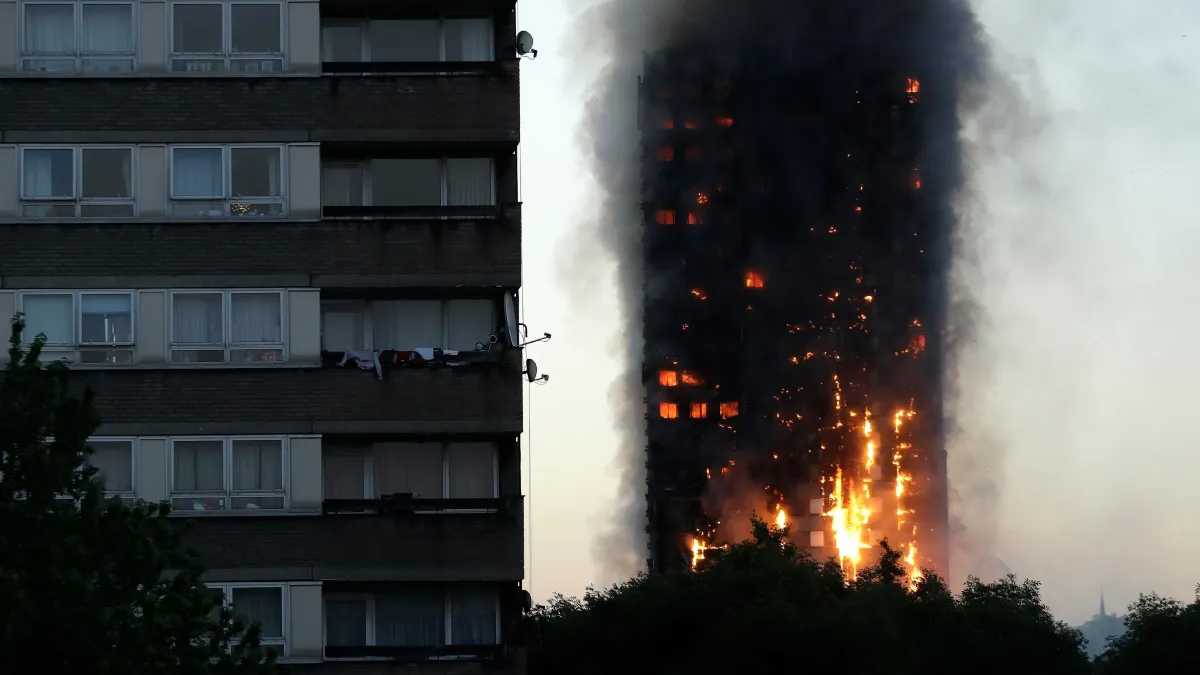The seven-year public inquiry also found that the Grenfell Tower disaster was due to “decades of failure” by the central government to stop the spread of combustible cladding, combined with the “systematic dishonesty” of multimillion-dollar companies whose products spread the fire that killed 72 people.
Sir Martin Moore-Bick, the chair of the inquiry, in his 1,700-page report apportioning blame for the 2017 tragedy far and wide, concluded that three firms – Arconic, Kingspan, and Celotex – “engaged in deliberate and sustained strategies to … mislead the market”.
He also identified the architects Studio E, the builders Rydon and Harley Facades, and the building control department from the Royal Borough of Kensington and Chelsea as sharing responsibility for the fire.
Studio E demonstrated “a cavalier attitude to the regulations affecting fire safety”. Its failure to recognize that the plastic-filled panels on the high-rise tower were dangerous was not the action of a “reasonably competent architect” and it “bears a very significant degree of responsibility for the disaster”, the inquiry found.
The inquiry was highly critical of the tenant management organization by the local authority, the Royal Borough of Kensington and Chelsea (RBKC), to take care of its many thousands of homes but which appears always to have disregarded residents’ views.
TMO chief executive Robert Black established a “pattern of concealment … about fire safety matters” and the TMO “treated the demands of managing fire safety as an inconvenience” in “a betrayal of its statutory obligations to its tenants”.
The final report of the public inquiry into Grenfell Tower comes seven years, two months, and 21 days after the fire, which began behind a fridge in a fourth-floor flat, raged through the combustible cladding system to the 24th floor in around 30 minutes. Some victims fell from windows but most died trapped by smoke and flames on the upper floors. Fifteen of the deceased were disabled.
After 400 days of evidence in an inquiry that has cost the UK taxpayer more than £200m, Moore-Bick saved some of his most damning conclusions for the central government.
It oversees building safety, but when it was involved in a “bonfire of red tape” led by then-Conservative prime minister David Cameron between 2010 and 2016-an effort to help stimulate the economy following the global financial crisis-it did not tighten ambiguous fire regulations.
The investigation team said the government was “well aware” of the risks posed by highly flammable cladding “but failed to act on what it knew”. Eric Pickles, Cameron’s housing secretary until 2015, had “enthusiastically supported” the prime minister’s drive to slash regulations and it dominated his department’s thinking to the extent that matters affecting fire safety and risk to life “were ignored, delayed, or disregarded”, the inquiry concluded.
Pickles also failed to act on a coroner’s 2013 recommendation to tighten up fire safety regulations after a cladding fire at Lakanal House, another London council block, killed six people. It was “not treated with any sense of urgency”, the inquiry found and the tightening up had not happened by the time Grenfell went up in flames on 14 June 2017.
Under oath in cross-examination, Pickles maintained strongly that building regulations had not been covered by the anti-red tape drive. But the inquiry said this evidence was “flatly contradicted by that of his officials and by the contemporaneous documents”.
Detectives from the Metropolitan police’s criminal investigation said that they would spend 12 to 18 months studying the findings “line by line” before possible charges. Those charges could include corporate manslaughter, gross negligence manslaughter, fraud, perverting the course of justice, and misconduct in public office. The Crown Prosecution Service has yet to make any charging decisions, and no trials are expected to begin until 2027.















